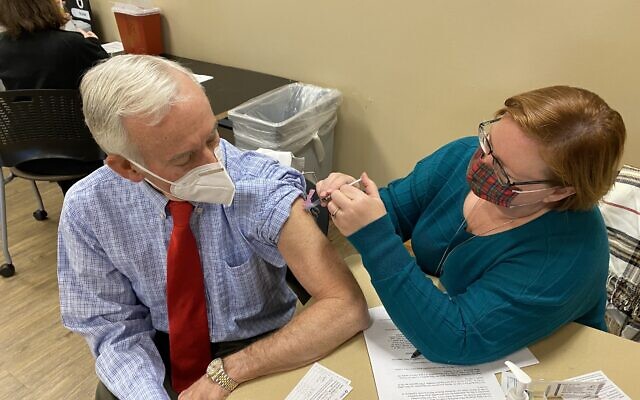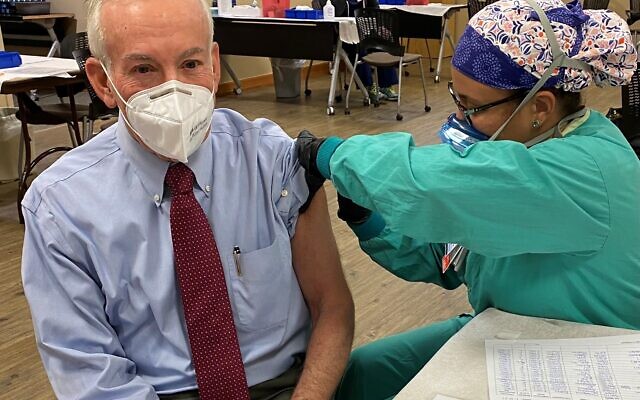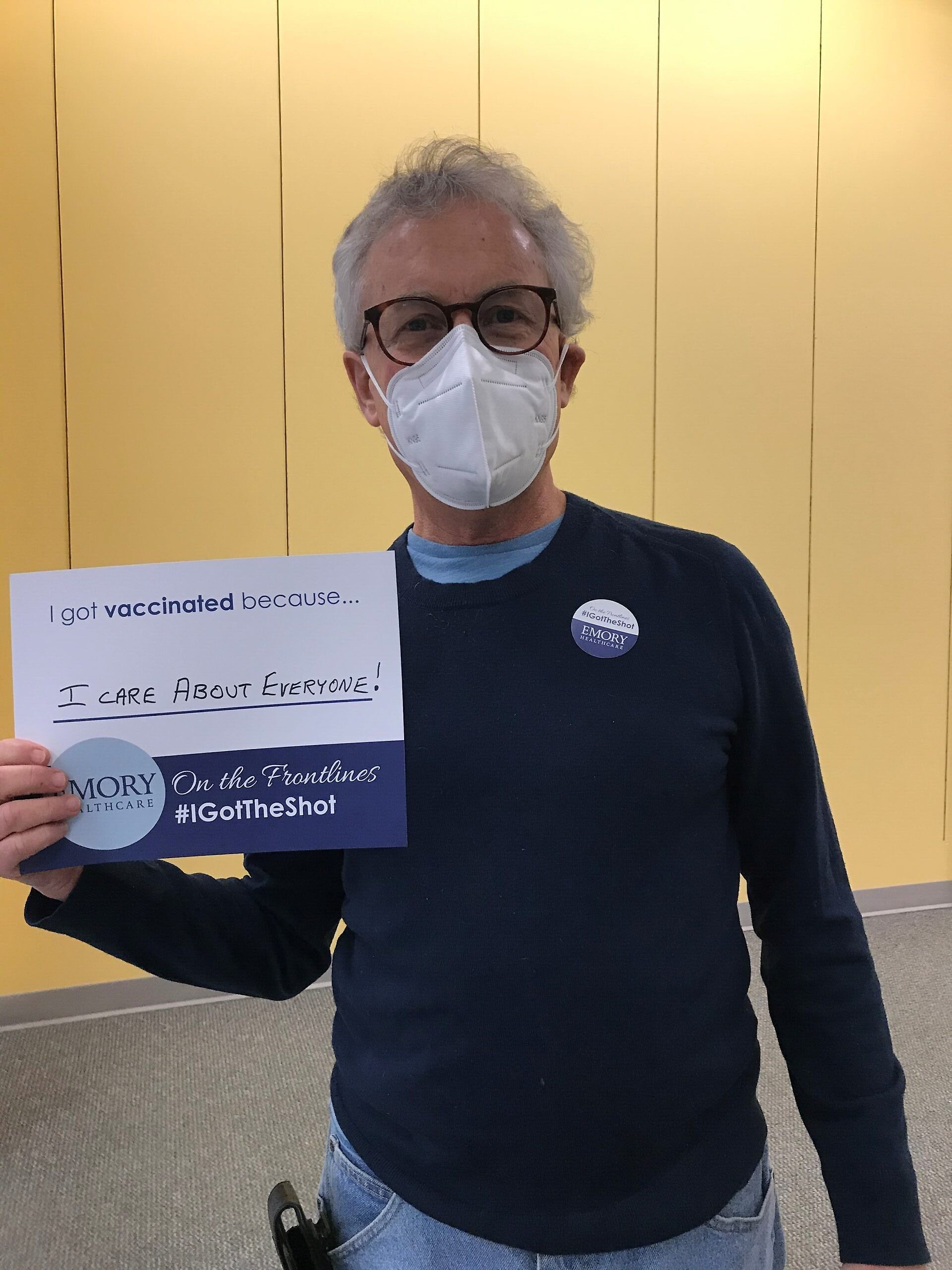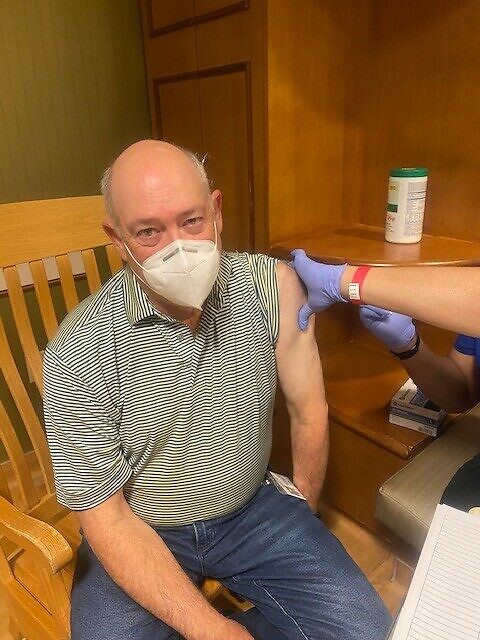COVID-19 Vaccine: Double Dose for Doctors
Jewish Atlanta’s physicians share their experience being among the first to receive COVID vaccines.

Over the past month, as the world began recovering from the largest health crisis in a century, Jewish Atlanta’s medical professionals joined the first ranks to receive life-saving vaccines touted as the way out of the malaise of 2020.
In Georgia, more than 300,000 vaccines have been administered, according to the Georgia Department of Public Health. The first phase of vaccinations is being administered to healthcare workers, residents and staff of long-term care facilities, adults 65 and old and their caregivers, law enforcement, firefighters and first responders, the DPH reported.
A few of those frontline workers, namely Atlanta doctors, shared their experiences with the AJT being among the select population to be vaccinated against the coronavirus. They said the process was easy and they had little reaction to the injection. They also agreed they’d still be wearing their masks and following other health precautions.
Just like a flu shot
When he heard that doctors would be among the first to receive the vaccine, Dr. Stanley Fineman thought, “hopefully I will arrange to get one. … When Kennestone Hospital offered it, I said, ‘Absolutely, I’ll take it.’” The Marietta allergist and immunologist received his first dose in late December and a second dose Jan. 12 from the hospital across the street from his Atlanta Allergy & Asthma office.
Based on her age, his wife also received her first dose Jan. 12 at the pharmacy in his office building. The pharmacist previously warned that her vaccination was dependent on availability, “so there are some problems with distribution channels.”
Fineman compared receiving the vaccine to the flu shot and didn’t have adverse reactions. He was initially concerned after hearing about allergic reactions from some patients in England and the United States. “I participate in panels that try to collect data on the potential reactions and safety.” The conclusion is that the benefits outweigh the small amount of risk, Fineman said.
For his own patients with a history of allergic reactions, such as from flu shots, insect stings or food allergies, he recommends waiting 30 minutes after receiving the vaccine to see if there’s a reaction rather than the average 15-minute wait. If there’s a severe reaction to the first dose, it’s not recommended that patients receive a second dose, he said. “In general, the number of patients with a severe reaction you can count on one hand compared with the thousands and thousands of doses given.”
He said he took Tylenol after receiving the shot and had some soreness in the area of the shot, but “it did not keep me from doing what I normally do.”
For those interested, Fineman is writing notes to help patients with immune deficiencies become candidates for receiving the vaccine.
But not everyone is eager to receive the shots, he said. “Although most of my staff is receiving the vaccine, there are a few who are wary and waiting a few months.”

For these and other reasons, Fineman said he isn’t throwing caution to the wind. “I still wear a mask. I am still not going out to restaurants. I’m still taking all the precautions to avoid potential exposure. It’s still important to do that.
“I’m not changing my behavior after two doses. I think right now with the surge higher, and more incidents and cases, and there may be a variant [of the virus] which the vaccine does protect us from, it would be foolish if I said ‘I had the vaccine and I can go to venues and restaurants. … With time, hopefully I will see other friends who’ve had the vaccine too,” Fineman said.
Not 100 percent
Dr. Barry Roseman, a Marietta breast cancer doctor and surgical oncologist, agreed the double vaccine doses he received Dec. 19 and Jan. 9 at Emory Healthcare don’t guarantee total protection from COVID.

“We are all going to wear masks and gloves ‘til the virus is gone,” he said about the 12 employees in his office and his patients. “Just because we were immunized doesn’t mean we can take any risks. Remember, it’s only 95 percent effective, not 100 percent.”
Also, he realizes not everyone will get vaccinated and that ups the risk. While half of his employees are enthusiastic about receiving the vaccine, a few “stragglers” have expressed apprehension about the shots, Roseman said. He said he’s hoping they will come around as more people they know get vaccinated without side effects. And he’s not above figuratively “twisting their arms a little bit,” he added.
Roseman said he wasn’t concerned about adverse reactions to the vaccine. “I have a degree in genetics, and I understand molecular biology, so I can’t quite figure out why someone would have a reaction to the mRNA vaccine.” He said he suspects the reactions are caused by the solution, material, solvents or liquid that help stabilize the vaccine to get into the cells.
“Some people are sensitive to things that are not natural in the body,” he said. “For example, more than 5 percent have an allergic reaction to something. … Getting sick from COVID was hundreds and thousands of times scarier than having a reaction to a vaccine.”
Roseman’s wife, who is eligible based on her age, received her vaccine Jan. 12. “It’s getting to pharmacies now. Everyone will have a chance to get the vaccination soon.”
A little sluggish
Dr. Dale Bearman, a Sandy Springs gynecologist, was surprised how fast he received the vaccine doses Dec. 23 and Jan. 10 at Northside Hospital, where he practices. “I have a daughter in the ER and she got the first vial that got to Northside. Priority was given to those in the ER, intensive care, respiratory therapy and those who have face-to-face contact with COVID positive” patients, he said.

“Anyone who provides clinical care is at risk. We see the dangers with hundreds of patients every day, and the majority have no idea if they are positive or negative.” That drives home the point of wearing masks diligently, he added.
“It offers a sense of relief, but my day-to-day life is not going to change because I got the vaccine.”
In terms of his risk, he said, “My perspective is: I am 64 years old and have a history of heart disease, so I had some of the same fears as most in my peer group. I am at risk of a severe reaction and possibly a poor outcome if I contract the virus.”
He “assumes” everyone in his practice took advantage of the opportunity to get vaccinated. But he doesn’t believe staff can be required to receive it. “It’s a personal choice. Plenty of folks are waiting for more people to be vaccinated before they make their decision.”
Bearman added that he is confident in the vaccine. “I believe the science behind it is excellent. … This vaccine was built on a platform that has been used successfully” in fighting Ebola and MERS (Middle East Respiratory Syndrome), he said. “This is not the first rodeo with this one and the results were outstanding.”
After receiving the first vaccine, Bearman said he was a little sore in the injection site and with the second dose, he felt sluggish for three hours. “That’s it.” But he has a radiologist doctor friend who complained after receiving the vaccine he “felt really fatigued for several days. That’s an unusual thing.”
Still, Bearman encourages patients to sign up for the vaccine whenever it’s available to them.
Fact Sheet By the Numbers:
Enrolled Providers
1,930
Pfizer Allocation
546,000
Moderna Allocation
776,000
Vaccines Administered
674,967
*Totals are cumulative from the initial date of vaccine availability.
Pfizer Shipped
522,600
Moderna Shipped
677,000
Source: Georgia Department of Public Health, as of Jan. 25.
Five points to consider about vaccines:
- Vaccine supply is very limited. Public health departments are scheduling vaccines by appointment only, as are most other providers. Depending on vaccine supply allocations from the federal government, it may be weeks before additional providers have vaccine available for quicker and more widespread distribution.
- To date, the vaccines are nearly 95 percent effective in preventing COVID-19. More than 70,000 people participated in clinical trials for the two vaccines to see if they are safe and effective.
- The vaccine imitates the infection so that our bodies create antibody defenses to fight off COVID-19. There is no COVID-19 virus in the vaccine.
- The first vaccination phase includes but is not limited to healthcare personnel likely to be exposed to or treat people with COVID-19, first responders, people at risk for severe illness and other essential workers. Those who will be vaccinated in the first phase will be notified where to receive the vaccine. These sites will likely be at or near work and care sites.
- Side effects are mild, temporary, and normal signs that your body is building protection. You may experience pain and swelling in the area of the injection. Throughout the rest of your body, you may experience fever, chills, tiredness and headaches.
For more information about the vaccine and how it is being administered in Georgia, visit the state Department of Public Health’s Georgia Vaccine Plan, https://dph.georgia.gov/covid-vaccine.



comments